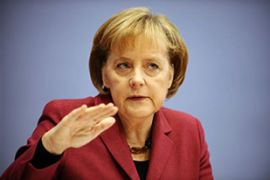New German coalition plans tax cuts
Chancellor says the CDU-FDP coalition is Germany’s “answer” to the economic crisis.

Soaring budget deficit
The announcement of income tax cuts of about $36bn, which are said to designed to spur economic growth, came at a time when Germany’s budget deficit is soaring.
| in depth | |||||||||
|
The country spends tens of billions of euros in interest payments on its debts each year, and it will borrow hundreds of billions more over the next few years.
Germany’s economy has been hit hard by the global slowdown, triggering its worst recession since the foundation of the Federal Republic in 1949.
Wolfgang Schaeuble, a CDU member and veteran interior minister, was named as the new finance minister after the coalition deal was struck.
Before the election, he indirectly criticised Merkel’s pledged tax cuts, saying there was little room for them given Germany’s strained finances.
But following announcement of the tax cuts, Schaeuble told ARD public television: “We will have to accept another exceptionally high debt.”
“But at the same time we have to remember that as soon as the crisis is overcome we must reduce this excessively high debt,” he said.
Nuclear weapons
Guido Westerwelle, the FDP leader, was set to become vice-chancellor and foreign minister in the new cabinet.
He vowed non-proliferation as his priority, including the withdrawal of the US nuclear warheads stationed in Germany since the Cold War.
“Foreign policy is not only about continuity, but also about new beginnings. That’s why I am glad about an agreement of the coalition to start talks with our partners in order to make Germany a country free of nuclear weapons.”
Since the Berlin Wall came down in November 1989, the US has removed 95 per cent of the weapons, but has not said how many nuclear weapons are still in Germany.
Another key point in the coalition agreement was reform of the nation’s health care system. It was expected to include a freeze on employers’ contributions, meaning individuals would carry the burden of any cost increases.
Child benefits and tax write-offs for families with children were to be increased in 2010.
After declaring victory in the September 27 elections, Merkel ditched her previous coalition partners, the centre-left Social Democrats, in favour of the pro-business FDP.
The incoming government’s coalition agreement was expected to be approved and signed on Monday.
